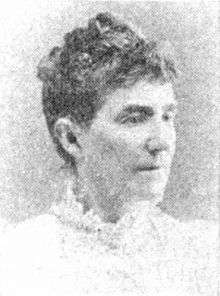Sara Louisa Oberholtzer
| Sara Louisa Oberholtzer | |
|---|---|
 |
Sara Louisa Oberholtzer (May 20 1841 – February 2, 1930[1]) was an American poet and activist.
Biography
She was born Sara Louisa Vickers in Uwchlan Township, Chester County, Pennsylvania on May 20, 1841. She was educated at Friends Boarding School, the state normal school in Millersville, and by private tutors.[2] On January 1, 1862, she married John Oberholtzer, of Norristown, Pennsylvania.[3] Their son Ellis Paxson Oberholtzer became a noted historian and biographer.
She was president of the Anti-Tobacco Society (organized by her in 1881), Longport Agassiz Microscopial Society (organized by her in 1884), the Soldiers' Aid Society, the World's Woman's Christian Temperance Union, the National Woman's Christian Temperance Union, the Pennsylvania Woman's Press Association (1903–05) and superintendent of the School Savings Bank of Pennsylvania.[1][4]
Beginning in 1890, Oberholtzer devoted much of her time to the introduction of the school savings banks system into the public schools of the United States and Canada. Her bulletin on “School Savings Banks,” written for the United States Bureau of Education, and printed by the government in 1914, was widely distributed. Files of her Thrift Tidings, a quarterly she issued regularly for the public beginning in 1907, could be found in most public libraries. She was the acknowledged leader of the school savings banks movement, which was established in public schools in nearly every state in the United States and some schools in Canada.[2]
She was one of the speakers at the first meeting of the National Council of Women in Washington, D.C. (1890), at the World's Congress of Women in Chicago in 1893, at the Geneva (Switzerland) meeting in 1903, and elsewhere.[2] She died February 2, 1930.
Literary works
At an early age, she began to contribute poems and articles in prose to newspapers and magazines. Among the books she published are:[3]
- Violet Lee, and other Poems (Philadelphia, 1872)
- Come for Arbutus, and other Wild Bloom (1882)
- Hope's Heart Bells, a story of Quaker life (1884)
- Daisies of Verse (1886)
- Souvenirs of Occasions
- Dialogues
- Letters of Travel
Her songs and hymns, set to music by different composers, were found in hymnals, and many of them in sheet form.[2]
References
| Wikimedia Commons has media related to Sara Louisa Oberholtzer. |
- 1 2 Anna Lane Lingelbach (1934). "Oberholtzer, Sara Louisa Vickers". Dictionary of American Biography. New York: Charles Scribner's Sons.
- 1 2 3 4
 Rines, George Edwin, ed. (1920). "Oberholtzer, Sara Louisa (Vickers)". Encyclopedia Americana.
Rines, George Edwin, ed. (1920). "Oberholtzer, Sara Louisa (Vickers)". Encyclopedia Americana. - 1 2
 One or more of the preceding sentences incorporates text from a publication now in the public domain: Wilson, James Grant; Fiske, John, eds. (1900). "Oberholtzer, Sara Louisa". Appletons' Cyclopædia of American Biography. New York: D. Appleton.
One or more of the preceding sentences incorporates text from a publication now in the public domain: Wilson, James Grant; Fiske, John, eds. (1900). "Oberholtzer, Sara Louisa". Appletons' Cyclopædia of American Biography. New York: D. Appleton. - ↑ Thomas William Herringshaw (1898). Herringshaw's encyclopedia of American biography of the nineteenth century. p. 700.